人教版(2019)必修三 Unit 2 Morals And Virtues (1) 课件(42张ppt)
文档属性
| 名称 | 人教版(2019)必修三 Unit 2 Morals And Virtues (1) 课件(42张ppt) |
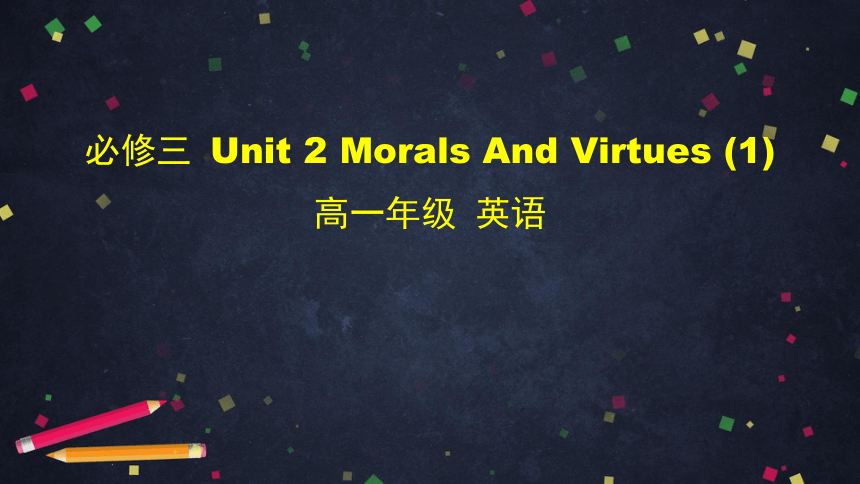
|
|
| 格式 | zip | ||
| 文件大小 | 12.8MB | ||
| 资源类型 | 教案 | ||
| 版本资源 | 人教版(2019) | ||
| 科目 | 英语 | ||
| 更新时间 | 2020-06-13 00:00:00 | ||
图片预览

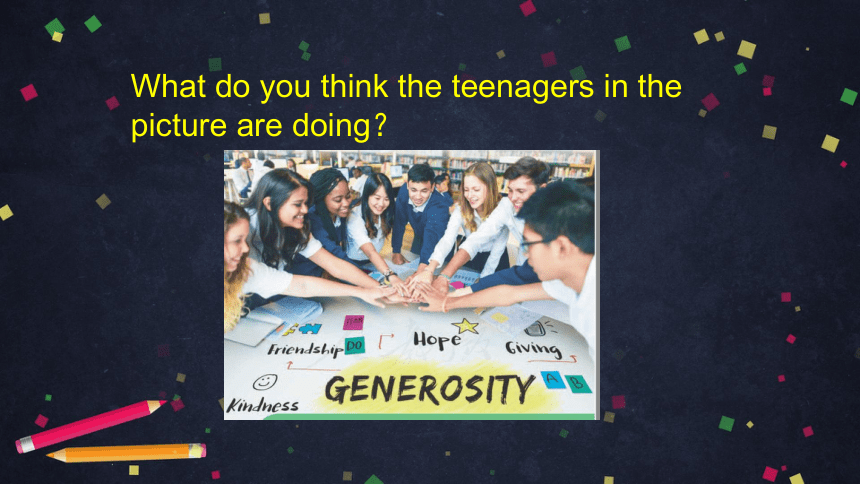
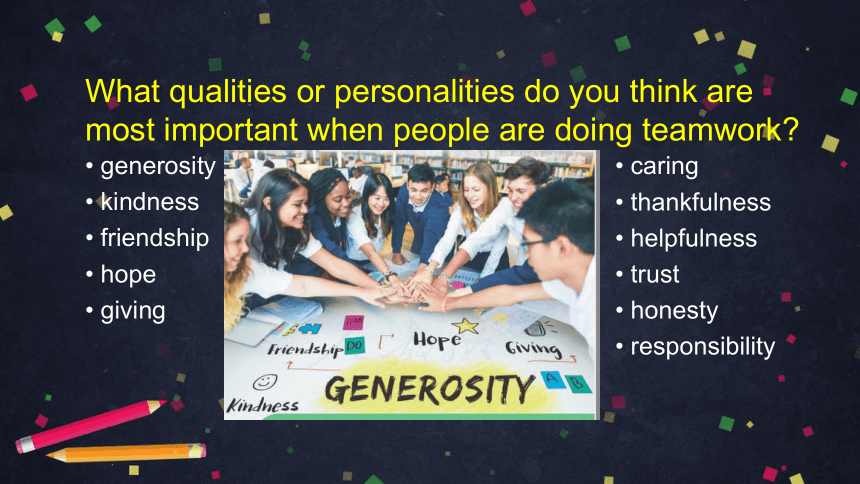
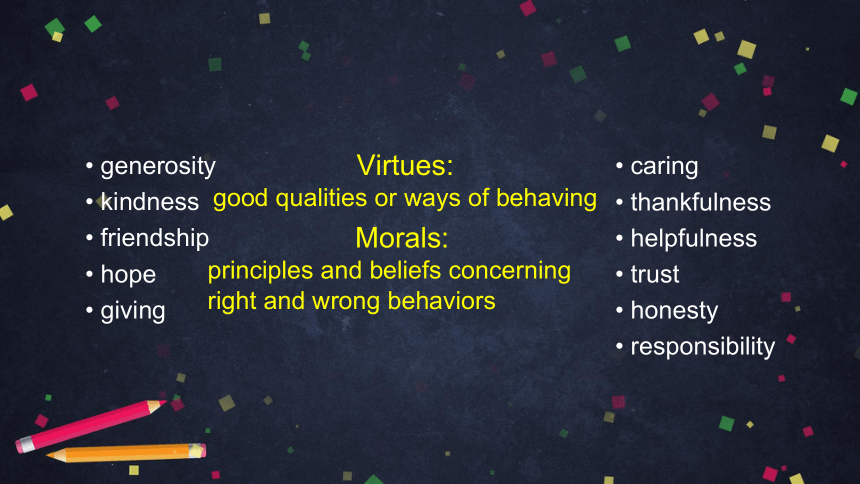
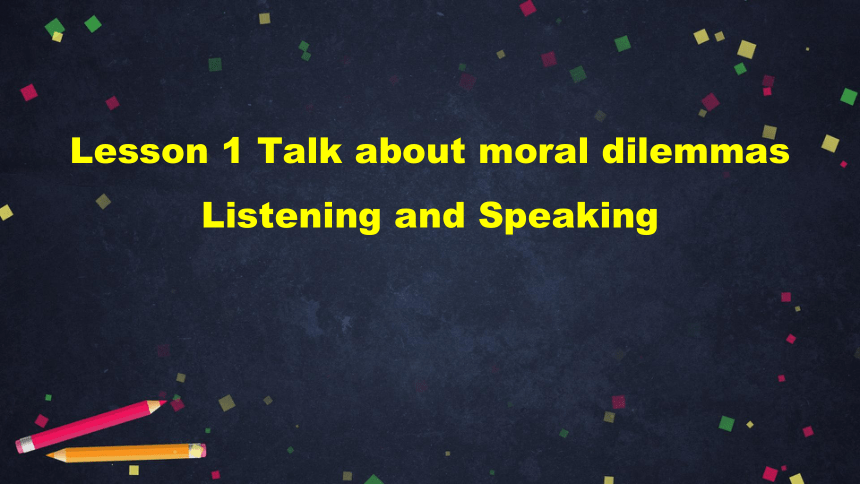
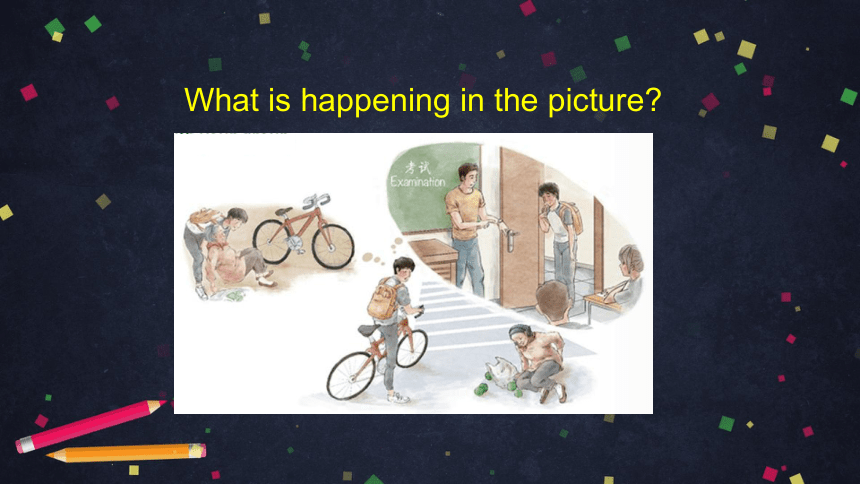
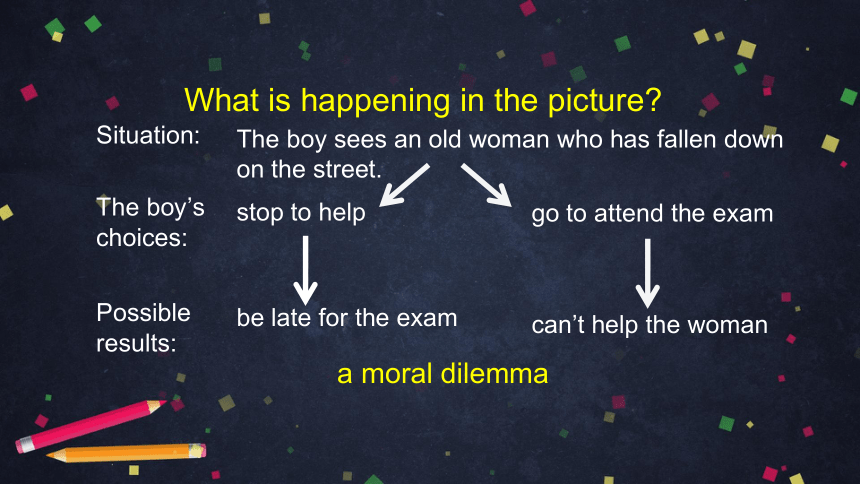
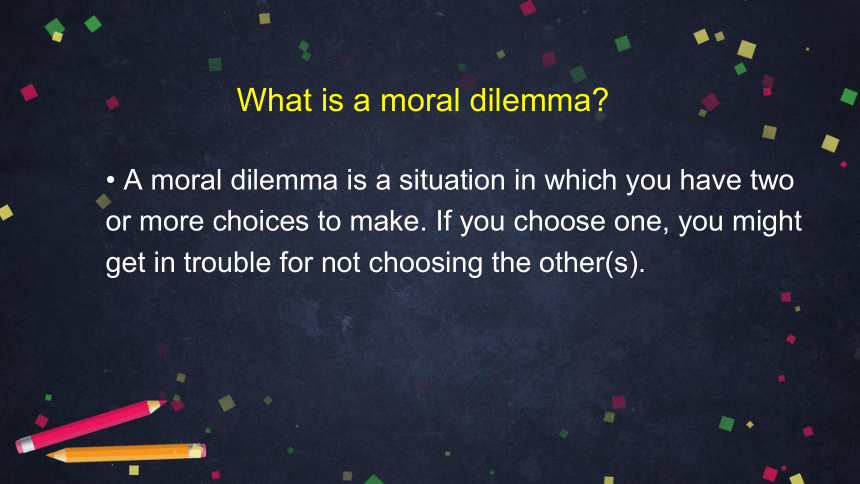
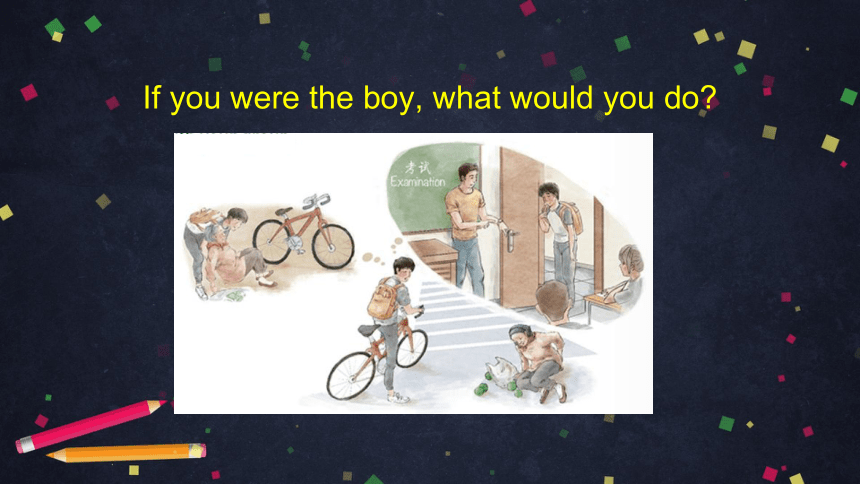
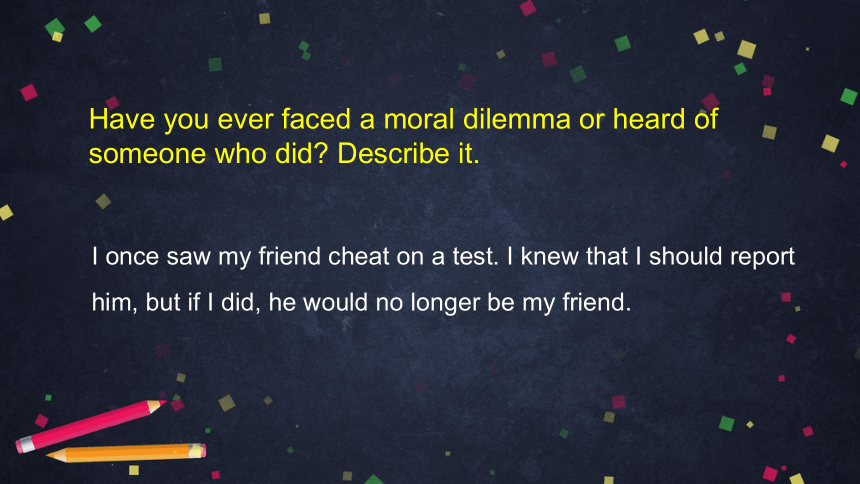
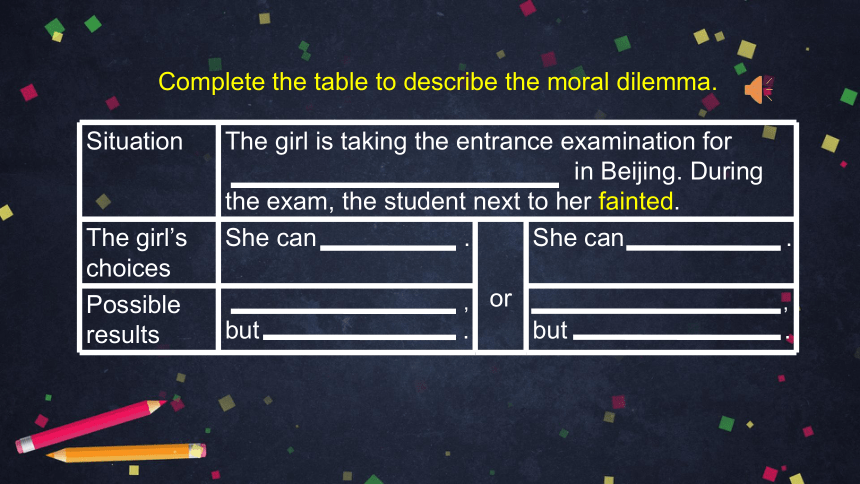
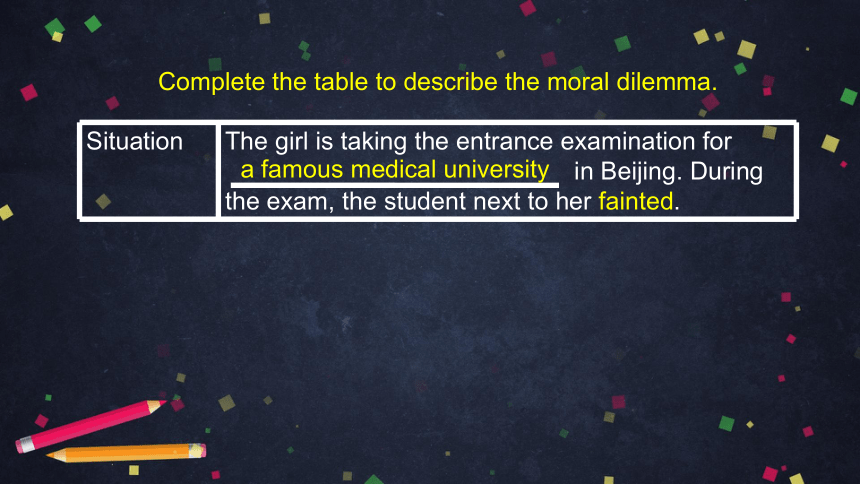
文档简介
(共42张PPT)
必修三
Unit
2
Morals
And
Virtues
(1)
高一年级
英语
What
do
you
think
the
teenagers
in
the
picture
are
doing?
What
qualities
or
personalities
do
you
think
are
most
important
when
people
are
doing
teamwork?
caring
thankfulness
helpfulness
trust
honesty
responsibility
generosity
kindness
friendship
hope
giving
Virtues:
good
qualities
or
ways
of
behaving
Morals:
principles
and
beliefs
concerning
right
and
wrong
behaviors
generosity
kindness
friendship
hope
giving
caring
thankfulness
helpfulness
trust
honesty
responsibility
Lesson
1
Talk
about
moral
dilemmas
Listening
and
Speaking
What
is
happening
in
the
picture?
Situation:
The
boy’s
choices:
Possible
results:
a
moral
dilemma
What
is
happening
in
the
picture?
The
boy
sees
an
old
woman
who
has
fallen
down
on
the
street.
stop
to
help
go
to
attend
the
exam
be
late
for
the
exam
can’t
help
the
woman
What
is
a
moral
dilemma?
A
moral
dilemma
is
a
situation
in
which
you
have
two
or
more
choices
to
make.
If
you
choose
one,
you
might
get
in
trouble
for
not
choosing
the
other(s).
If
you
were
the
boy,
what
would
you
do?
Have
you
ever
faced
a
moral
dilemma
or
heard
of
someone
who
did?
Describe
it.
I
once
saw
my
friend
cheat
on
a
test.
I
knew
that
I
should
report
him,
but
if
I
did,
he
would
no
longer
be
my
friend.
Situation
The
girl
is
taking
the
entrance
examination
for
in
Beijing.
During
the
exam,
the
student
next
to
her
fainted.
The
girl’s
choices
She
can
.
or
She
can
.
Possible
results
,
but
.
,
but
.
Complete
the
table
to
describe
the
moral
dilemma.
Situation
The
girl
is
taking
the
entrance
examination
for
in
Beijing.
During
the
exam,
the
student
next
to
her
fainted.
Complete
the
table
to
describe
the
moral
dilemma.
a
famous
medical
university
The
girl’s
choices
She
can
or
She
can
Possible
results
give
up
her
chance
finish
the
exam
She
will
get
into
medical
university
stop
and
help
the
girl
the
girl
might
not
She
can
put
the
needs
of
the
other
person
first
to
get
into
the
university
get
the
help
she
needs
Complete
the
table
to
describe
the
moral
dilemma.
but
but
.
.
.
,
,
.
Jane
is
eager
to
share
the
magazine
article
with
Luke.
Luke
doubts
that
young
people
face
moral
dilemmas
all
the
time.
Jane
admires
what
the
girl
in
the
story
did.
Luke
doesn’t
believe
anybody
would
do
what
the
girl
in
the
story
did.
Jane
wonders
how
the
girl
became
a
doctor
later.
Listen
again
and
decide
whether
the
statements
are
true
or
false.
Jane
is
eager
to
share
the
magazine
article
with
Luke.
Listen
again
and
decide
whether
the
statements
are
true
or
false.
Jane:
I’m
reading
a
very
interesting
magazine
article
about
moral
dilemmas.
T
Luke
doubts
that
young
people
face
moral
dilemmas
all
the
time.
Listen
again
and
decide
whether
the
statements
are
true
or
false.
Luke:
Oh,
situations
like
that
don’t
happen
very
often,
do
they?
T
Jane
admires
what
the
girl
in
the
story
did.
Listen
again
and
decide
whether
the
statements
are
true
or
false.
Jane:
Well,
that’s
what
I
thought—but
not
this
girl.
She
stopped
to
help
the
student,
thinking
that
it
was
better
to
put
the
needs
of
the
other
person
first.
T
Luke
doesn’t
believe
anybody
would
do
what
the
girl
in
the
story
did.
Listen
again
and
decide
whether
the
statements
are
true
or
false.
T
Luke:
I
can’t
believe
she
would
give
up
her
chance
to
get
into
medical
university!
Who
would
do
such
a
thing?
Jane
wonders
how
the
girl
became
a
doctor
later.
Listen
again
and
decide
whether
the
statements
are
true
or
false.
F
Jane:
She
later
DID
get
into
medical
university
and
then
she
became
a
great
doctor.
Listen
for
attitudes.
We
know
the
attitude
of
a
speaker
from
the
language
itself.
descriptive
words
tag
questions
negative
sentences
emphatic
sentences
exaggerate
their
intonation
strongly
disagree
with
something
speak
very
quickly
or
loudly
be
excited
or
angry
speak
slowly
or
stop
often
be
confused
or
not
sure
about
what
they
are
saying
Listen
for
attitudes.
When
you
listen,
you
should
pay
attention
not
only
to
the
words
but
also
to
HOW
the
speaker
is
talking.
What
did
the
girl
do
to
help
the
student?
What
was
the
girl’s
name?
What
was
she
famous
for?
What
did
Jane
say
about
the
girl’s
life?
Listen
to
the
conversation
carefully
and
answer
the
questions.
What
did
the
girl
do
to
help
the
student?
She
carried
the
student
to
a
safe
place
and
looked
after
her.
Then
she
went
to
the
hospital
with
the
student
and
called
her
sister.
Listen
to
the
conversation
carefully
and
answer
the
questions.
2.
What
was
the
girl’s
name?
What
was
she
famous
for?
Her
name
was
Lin
Qiaozhi.
She
later
became
a
great
doctor.
She
was
famous
for
caring
for
tens
of
thousands
of
women
and
their
babies.
Listen
to
the
conversation
carefully
and
answer
the
questions.
What
did
Jane
say
about
the
girl’s
life?
Her
life
was
full
of
hard
choices,
but
she
didn’t
let
them
stop
her
from
taking
care
of
people
who
were
in
need.
She
always
cared
for
others
more
than
herself.
Listen
to
the
conversation
carefully
and
answer
the
questions.
Luke:
Hi
Jane!
What
are
you
reading?
Jane:
Oh,
hey,
Luke!
I’m
reading
a
very
interesting
magazine
article
about
moral
dilemmas.
Luke:
Moral
dilemma?
What
do
you
mean?
Jane:
You
know,
it’s
when
you
have
two
choices,
and
you
have
to
choose
one,
but
for
moral
reasons,
sometimes
it
could
be
really
difficult
to
decide.
Luke:
Oh,
situations
like
that
don’t
happen
very
often,
do
they?
Please
listen
to
the
conversation
and
read
after
the
tape.
Jane:
Actually,
I
think
people
face
moral
dilemmas
all
the
time,
even
us
students.
Luke:
Really?
Like
what?
Jane:
Well,
for
example,
it
mentions
a
girl
who
was
taking
the
entrance
exam
for
a
medical
university
in
Beijing.
During
the
exam,
the
student
next
to
her
fainted.
The
girl
had
a
choice.
Should
she
finish
the
exam
or
should
she
stop
and
help
the
student?
Luke:
Surely
the
teachers
would
look
after
the
student
who
fainted.
Jane:
Well,
that’s
what
I
thought—but
not
this
girl.
She
stopped
to
help
the
student,
thinking
that
it
was
better
to
put
the
needs
of
the
other
person
first.
Luke:
So
what
happened
to
her
exam?
Jane:
She
never
finished
it.
Instead,
she
carried
the
student
to
a
safe
place
and
looked
after
her.
Then
she
went
to
the
hospital
with
the
student
and
called
her
sister.
Luke:
I
can’t
believe
she
would
give
up
her
chance
to
get
into
medical
university!
Who
would
do
such
a
thing?
Jane:
Well,
that
girl
was
Lin
Qiaozhi.
She
later
DID
get
into
medical
university
and
then
she
became
a
great
doctor.
She
became
famous
for
caring
for
tens
of
thousands
of
women
and
their
babies.
Luke:
Oh,
wow!
So
she
became
a
doctor
even
though
she
left
her
exam
that
day!
Jane:
Yes.
Her
life
was
full
of
hard
choices,
but
she
didn’t
let
them
stop
her
from
taking
care
of
people
who
were
in
need.
She
always
cared
for
others
more
than
for
herself.
What
you
would
do
if
you
were
ever
faced
with
the
same
situation
as
the
girl?
In
my
opinion/
view…
Generally
speaking,
…
To
my
mind…
I’d
just
like
to
say...
As
far
as
I’m
concerned…
To
be
honest/
frank…
What
you
would
do
if
you
were
ever
faced
with
the
same
situation
as
the
girl.
In
my
view,
if
I
were
faced
with
the
same
situation,
I
would
do
as
Lin
Qiaozhi
did.
I
think
I
would
choose
to
help
the
student
because
life
matters
most.
Listen
to
the
conversations
and
match
each
rising
intonation
with
its
meaning.
1.
A:
You
know
Angela?
B:
Yes.
A.
Having
more
to
say.
B.
Hoping
the
other
person
will
continue
to
talk.
C.
Asking
for
confirmation.
Listen
to
the
conversations
and
match
each
rising
intonation
with
its
meaning.
1.
A:
You
know
Angela?
B:
Yes.
A.
Having
more
to
say.
B.
Hoping
the
other
person
will
continue
to
talk.
C.
Asking
for
confirmation.
Listen
to
the
conversations
and
match
each
rising
intonation
with
its
meaning.
2.
A:
You
volunteer
at
the
local
shelter,
don’t
you?
B:
Yes.
It’s
a
great
experience.
A.
Having
more
to
say.
B.
Hoping
the
other
person
will
continue
to
talk.
C.
Asking
for
confirmation.
Listen
to
the
conversations
and
match
each
rising
intonation
with
its
meaning.
2.
A:
You
volunteer
at
the
local
shelter,
don’t
you?
B:
Yes.
It’s
a
great
experience.
A.
Having
more
to
say.
B.
Hoping
the
other
person
will
continue
to
talk.
C.
Asking
for
confirmation.
3.
A:
Did
you
hear
that
James
helped
an
old
woman
who
fell
down
while
crossing
the
street?
B:
Yes.
It
was
a
bit
dangerous,
but
he
got
all
the
cars
to
stop.
Listen
to
the
conversations
and
match
each
rising
intonation
with
its
meaning.
A.
Having
more
to
say.
B.
Hoping
the
other
person
will
continue
to
talk.
C.
Asking
for
confirmation.
Listen
to
the
conversations
and
match
each
rising
intonation
with
its
meaning.
3.
A:
Did
you
hear
that
James
helped
an
old
woman
who
fell
down
while
crossing
the
street?
B:
Yes.
It
was
a
bit
dangerous,
but
he
got
all
the
cars
to
stop.
A.
Having
more
to
say.
B.
Hoping
the
other
person
will
continue
to
talk.
C.
Asking
for
confirmation.
Read
the
conversation
and
mark
in
the
correct
places.
Notice
the
meaning
of
each
rising
intonation.
Listen
to
the
conversation
and
find
out
the
rising
intonation.
Notice
the
meaning
of
each
rising
intonation.
Peter:
It’s
a
nice
day,
isn’t
it?
Nick:
Yes,
but
it
looks
gloomy
to
me.
Peter:
Why?
What
happened?
Nick:
You
know
Tony?
Peter:
Yes.
Nick:
He
asked
me
to
write
an
essay
for
him.
But
I
don’t
think
it’s
the
right
thing
to
do.
Do
you?
Listen
to
the
conversation
and
find
out
the
rising
intonation.
Notice
the
meaning
of
each
rising
intonation.
Peter:
No,
it’s
not.
Nick:
But
I’m
afraid
to
lose
him
as
a
friend.
Peter:
Well,
good
friends
should
help
each
other.
But
it
doesn’t
mean
you
should
help
him
cheat!
Why
not
help
him
with
his
schoolwork?
Nick:
Good
idea!
Listen
to
the
conversation
and
find
out
the
rising
intonation.
Notice
the
meaning
of
each
rising
intonation.
Homework
Read
the
listening
material
aloud.
Prepare
an
oral
presentation
about
“What
should
we
do
when
facing
the
moral
dilemmas?”
必修三
Unit
2
Morals
And
Virtues
(1)
高一年级
英语
What
do
you
think
the
teenagers
in
the
picture
are
doing?
What
qualities
or
personalities
do
you
think
are
most
important
when
people
are
doing
teamwork?
caring
thankfulness
helpfulness
trust
honesty
responsibility
generosity
kindness
friendship
hope
giving
Virtues:
good
qualities
or
ways
of
behaving
Morals:
principles
and
beliefs
concerning
right
and
wrong
behaviors
generosity
kindness
friendship
hope
giving
caring
thankfulness
helpfulness
trust
honesty
responsibility
Lesson
1
Talk
about
moral
dilemmas
Listening
and
Speaking
What
is
happening
in
the
picture?
Situation:
The
boy’s
choices:
Possible
results:
a
moral
dilemma
What
is
happening
in
the
picture?
The
boy
sees
an
old
woman
who
has
fallen
down
on
the
street.
stop
to
help
go
to
attend
the
exam
be
late
for
the
exam
can’t
help
the
woman
What
is
a
moral
dilemma?
A
moral
dilemma
is
a
situation
in
which
you
have
two
or
more
choices
to
make.
If
you
choose
one,
you
might
get
in
trouble
for
not
choosing
the
other(s).
If
you
were
the
boy,
what
would
you
do?
Have
you
ever
faced
a
moral
dilemma
or
heard
of
someone
who
did?
Describe
it.
I
once
saw
my
friend
cheat
on
a
test.
I
knew
that
I
should
report
him,
but
if
I
did,
he
would
no
longer
be
my
friend.
Situation
The
girl
is
taking
the
entrance
examination
for
in
Beijing.
During
the
exam,
the
student
next
to
her
fainted.
The
girl’s
choices
She
can
.
or
She
can
.
Possible
results
,
but
.
,
but
.
Complete
the
table
to
describe
the
moral
dilemma.
Situation
The
girl
is
taking
the
entrance
examination
for
in
Beijing.
During
the
exam,
the
student
next
to
her
fainted.
Complete
the
table
to
describe
the
moral
dilemma.
a
famous
medical
university
The
girl’s
choices
She
can
or
She
can
Possible
results
give
up
her
chance
finish
the
exam
She
will
get
into
medical
university
stop
and
help
the
girl
the
girl
might
not
She
can
put
the
needs
of
the
other
person
first
to
get
into
the
university
get
the
help
she
needs
Complete
the
table
to
describe
the
moral
dilemma.
but
but
.
.
.
,
,
.
Jane
is
eager
to
share
the
magazine
article
with
Luke.
Luke
doubts
that
young
people
face
moral
dilemmas
all
the
time.
Jane
admires
what
the
girl
in
the
story
did.
Luke
doesn’t
believe
anybody
would
do
what
the
girl
in
the
story
did.
Jane
wonders
how
the
girl
became
a
doctor
later.
Listen
again
and
decide
whether
the
statements
are
true
or
false.
Jane
is
eager
to
share
the
magazine
article
with
Luke.
Listen
again
and
decide
whether
the
statements
are
true
or
false.
Jane:
I’m
reading
a
very
interesting
magazine
article
about
moral
dilemmas.
T
Luke
doubts
that
young
people
face
moral
dilemmas
all
the
time.
Listen
again
and
decide
whether
the
statements
are
true
or
false.
Luke:
Oh,
situations
like
that
don’t
happen
very
often,
do
they?
T
Jane
admires
what
the
girl
in
the
story
did.
Listen
again
and
decide
whether
the
statements
are
true
or
false.
Jane:
Well,
that’s
what
I
thought—but
not
this
girl.
She
stopped
to
help
the
student,
thinking
that
it
was
better
to
put
the
needs
of
the
other
person
first.
T
Luke
doesn’t
believe
anybody
would
do
what
the
girl
in
the
story
did.
Listen
again
and
decide
whether
the
statements
are
true
or
false.
T
Luke:
I
can’t
believe
she
would
give
up
her
chance
to
get
into
medical
university!
Who
would
do
such
a
thing?
Jane
wonders
how
the
girl
became
a
doctor
later.
Listen
again
and
decide
whether
the
statements
are
true
or
false.
F
Jane:
She
later
DID
get
into
medical
university
and
then
she
became
a
great
doctor.
Listen
for
attitudes.
We
know
the
attitude
of
a
speaker
from
the
language
itself.
descriptive
words
tag
questions
negative
sentences
emphatic
sentences
exaggerate
their
intonation
strongly
disagree
with
something
speak
very
quickly
or
loudly
be
excited
or
angry
speak
slowly
or
stop
often
be
confused
or
not
sure
about
what
they
are
saying
Listen
for
attitudes.
When
you
listen,
you
should
pay
attention
not
only
to
the
words
but
also
to
HOW
the
speaker
is
talking.
What
did
the
girl
do
to
help
the
student?
What
was
the
girl’s
name?
What
was
she
famous
for?
What
did
Jane
say
about
the
girl’s
life?
Listen
to
the
conversation
carefully
and
answer
the
questions.
What
did
the
girl
do
to
help
the
student?
She
carried
the
student
to
a
safe
place
and
looked
after
her.
Then
she
went
to
the
hospital
with
the
student
and
called
her
sister.
Listen
to
the
conversation
carefully
and
answer
the
questions.
2.
What
was
the
girl’s
name?
What
was
she
famous
for?
Her
name
was
Lin
Qiaozhi.
She
later
became
a
great
doctor.
She
was
famous
for
caring
for
tens
of
thousands
of
women
and
their
babies.
Listen
to
the
conversation
carefully
and
answer
the
questions.
What
did
Jane
say
about
the
girl’s
life?
Her
life
was
full
of
hard
choices,
but
she
didn’t
let
them
stop
her
from
taking
care
of
people
who
were
in
need.
She
always
cared
for
others
more
than
herself.
Listen
to
the
conversation
carefully
and
answer
the
questions.
Luke:
Hi
Jane!
What
are
you
reading?
Jane:
Oh,
hey,
Luke!
I’m
reading
a
very
interesting
magazine
article
about
moral
dilemmas.
Luke:
Moral
dilemma?
What
do
you
mean?
Jane:
You
know,
it’s
when
you
have
two
choices,
and
you
have
to
choose
one,
but
for
moral
reasons,
sometimes
it
could
be
really
difficult
to
decide.
Luke:
Oh,
situations
like
that
don’t
happen
very
often,
do
they?
Please
listen
to
the
conversation
and
read
after
the
tape.
Jane:
Actually,
I
think
people
face
moral
dilemmas
all
the
time,
even
us
students.
Luke:
Really?
Like
what?
Jane:
Well,
for
example,
it
mentions
a
girl
who
was
taking
the
entrance
exam
for
a
medical
university
in
Beijing.
During
the
exam,
the
student
next
to
her
fainted.
The
girl
had
a
choice.
Should
she
finish
the
exam
or
should
she
stop
and
help
the
student?
Luke:
Surely
the
teachers
would
look
after
the
student
who
fainted.
Jane:
Well,
that’s
what
I
thought—but
not
this
girl.
She
stopped
to
help
the
student,
thinking
that
it
was
better
to
put
the
needs
of
the
other
person
first.
Luke:
So
what
happened
to
her
exam?
Jane:
She
never
finished
it.
Instead,
she
carried
the
student
to
a
safe
place
and
looked
after
her.
Then
she
went
to
the
hospital
with
the
student
and
called
her
sister.
Luke:
I
can’t
believe
she
would
give
up
her
chance
to
get
into
medical
university!
Who
would
do
such
a
thing?
Jane:
Well,
that
girl
was
Lin
Qiaozhi.
She
later
DID
get
into
medical
university
and
then
she
became
a
great
doctor.
She
became
famous
for
caring
for
tens
of
thousands
of
women
and
their
babies.
Luke:
Oh,
wow!
So
she
became
a
doctor
even
though
she
left
her
exam
that
day!
Jane:
Yes.
Her
life
was
full
of
hard
choices,
but
she
didn’t
let
them
stop
her
from
taking
care
of
people
who
were
in
need.
She
always
cared
for
others
more
than
for
herself.
What
you
would
do
if
you
were
ever
faced
with
the
same
situation
as
the
girl?
In
my
opinion/
view…
Generally
speaking,
…
To
my
mind…
I’d
just
like
to
say...
As
far
as
I’m
concerned…
To
be
honest/
frank…
What
you
would
do
if
you
were
ever
faced
with
the
same
situation
as
the
girl.
In
my
view,
if
I
were
faced
with
the
same
situation,
I
would
do
as
Lin
Qiaozhi
did.
I
think
I
would
choose
to
help
the
student
because
life
matters
most.
Listen
to
the
conversations
and
match
each
rising
intonation
with
its
meaning.
1.
A:
You
know
Angela?
B:
Yes.
A.
Having
more
to
say.
B.
Hoping
the
other
person
will
continue
to
talk.
C.
Asking
for
confirmation.
Listen
to
the
conversations
and
match
each
rising
intonation
with
its
meaning.
1.
A:
You
know
Angela?
B:
Yes.
A.
Having
more
to
say.
B.
Hoping
the
other
person
will
continue
to
talk.
C.
Asking
for
confirmation.
Listen
to
the
conversations
and
match
each
rising
intonation
with
its
meaning.
2.
A:
You
volunteer
at
the
local
shelter,
don’t
you?
B:
Yes.
It’s
a
great
experience.
A.
Having
more
to
say.
B.
Hoping
the
other
person
will
continue
to
talk.
C.
Asking
for
confirmation.
Listen
to
the
conversations
and
match
each
rising
intonation
with
its
meaning.
2.
A:
You
volunteer
at
the
local
shelter,
don’t
you?
B:
Yes.
It’s
a
great
experience.
A.
Having
more
to
say.
B.
Hoping
the
other
person
will
continue
to
talk.
C.
Asking
for
confirmation.
3.
A:
Did
you
hear
that
James
helped
an
old
woman
who
fell
down
while
crossing
the
street?
B:
Yes.
It
was
a
bit
dangerous,
but
he
got
all
the
cars
to
stop.
Listen
to
the
conversations
and
match
each
rising
intonation
with
its
meaning.
A.
Having
more
to
say.
B.
Hoping
the
other
person
will
continue
to
talk.
C.
Asking
for
confirmation.
Listen
to
the
conversations
and
match
each
rising
intonation
with
its
meaning.
3.
A:
Did
you
hear
that
James
helped
an
old
woman
who
fell
down
while
crossing
the
street?
B:
Yes.
It
was
a
bit
dangerous,
but
he
got
all
the
cars
to
stop.
A.
Having
more
to
say.
B.
Hoping
the
other
person
will
continue
to
talk.
C.
Asking
for
confirmation.
Read
the
conversation
and
mark
in
the
correct
places.
Notice
the
meaning
of
each
rising
intonation.
Listen
to
the
conversation
and
find
out
the
rising
intonation.
Notice
the
meaning
of
each
rising
intonation.
Peter:
It’s
a
nice
day,
isn’t
it?
Nick:
Yes,
but
it
looks
gloomy
to
me.
Peter:
Why?
What
happened?
Nick:
You
know
Tony?
Peter:
Yes.
Nick:
He
asked
me
to
write
an
essay
for
him.
But
I
don’t
think
it’s
the
right
thing
to
do.
Do
you?
Listen
to
the
conversation
and
find
out
the
rising
intonation.
Notice
the
meaning
of
each
rising
intonation.
Peter:
No,
it’s
not.
Nick:
But
I’m
afraid
to
lose
him
as
a
friend.
Peter:
Well,
good
friends
should
help
each
other.
But
it
doesn’t
mean
you
should
help
him
cheat!
Why
not
help
him
with
his
schoolwork?
Nick:
Good
idea!
Listen
to
the
conversation
and
find
out
the
rising
intonation.
Notice
the
meaning
of
each
rising
intonation.
Homework
Read
the
listening
material
aloud.
Prepare
an
oral
presentation
about
“What
should
we
do
when
facing
the
moral
dilemmas?”
